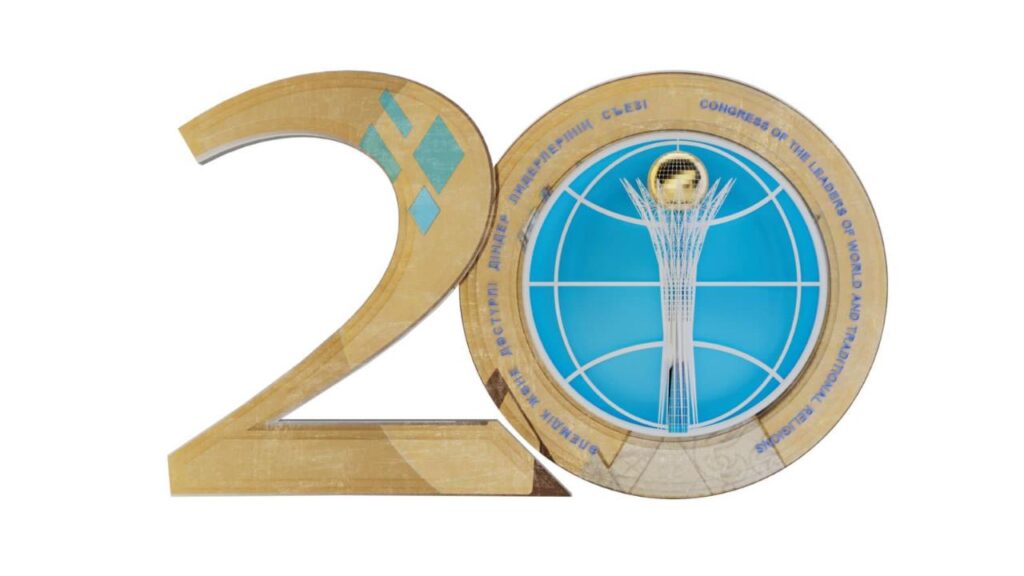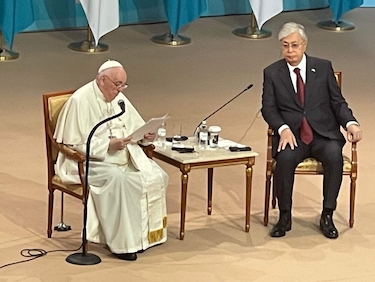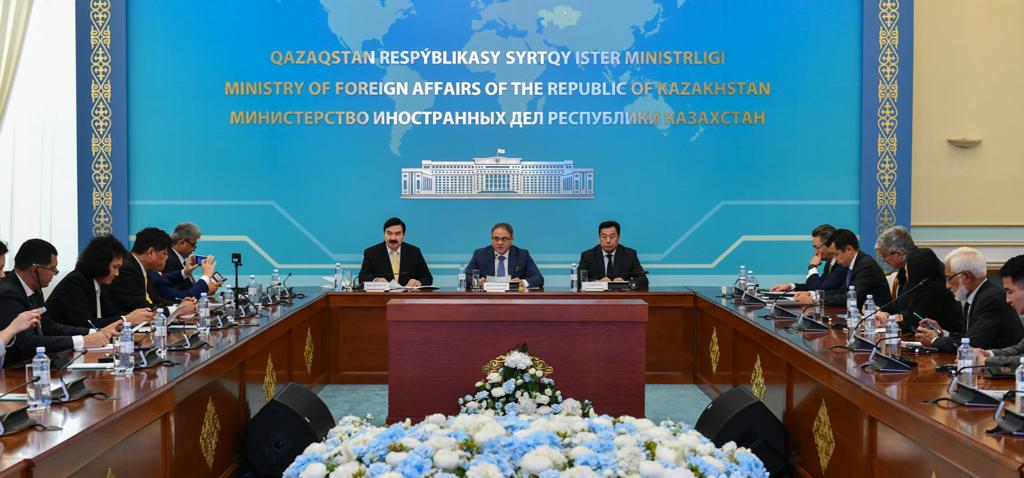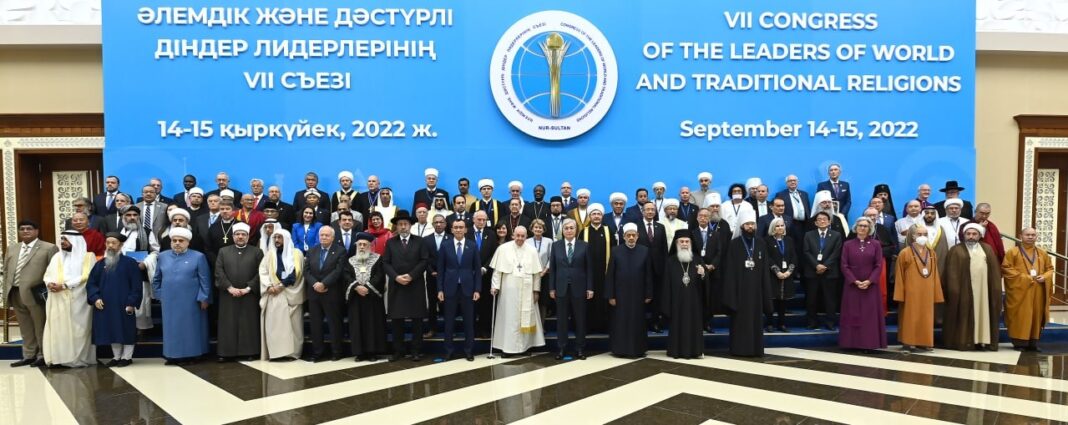By Katsuhiro Asagiri

Astana (INPS Japan) —In the heart of Central Asia, a nation renowned for its rich cultural diversity, multi-ethnic society, and spiritual traditions has emerged as a global beacon of interfaith harmony and understanding. Over the past two decades, Kazakhstan’s Congress of Leaders of World and Traditional Religions has played an instrumental role in promoting dialogue, forging unity, and advocating for peace among diverse faiths worldwide. Rooted in Kazakhstan’s deep spiritual heritage and wisdom, this initiative has evolved into a symbol of international cooperation and tolerance. As we reflect on its remarkable journey and look ahead to its future under the leadership of President Kassym-Jomart Tokayev, it becomes evident that this Congress is poised to make even greater strides toward fostering global harmony and unity. JAPANESE
A History of Resilience and Tolerance
Kazakhstan’s history is a tapestry woven with threads of resilience, tolerance, and spiritual fortitude. A nation that transitioned from a nomadic civilization to a modern, multi-ethnic, and multi-religious society faced numerous trials and tribulations along the way. Yet, the Kazakh people maintained a steadfast connection to their spiritual roots, allowing them to thrive in a diverse and inclusive society.
Historical Hardships and Spiritual Resilience
The hardships endured by the Kazakh people throughout history have shaped their deep spirituality and wisdom. From Russian imperial expansion to the ravages of the Soviet era, Kazakhstan faced tremendous challenges. Forced settlement policies, famine, and the suppression of cultural and religious identity were stark realities. However, these trials also ignited a collective spirit of survival and resilience, demonstrating the importance of cultural preservation and the celebration of diversity.
Religious Freedom and Tolerance
Kazakhstan’s journey to independence brought with it a commitment to religious freedom and tolerance. From 1949 to 1989, the Soviet Union conducted 456 nuclear tests at the Semipalatinsk nuclear testing site in eastern Kazakhstan, an area roughly equivalent in size to Japan’s Shikoku Island (Country of Belgium). It is estimated that about 1.5 million people suffered health effects as a result of these tests. Despite this history of adversity, when the Soviet Union dissolved, Kazakhstan, not only guaranteed equality for all ethnic groups and religious freedom (religion was considered poison and suppressed under the Soviet regime) but also successfully secured the closure of the Semipalatinsk nuclear testing site and the complete abandonment of the world’s fourth-largest nuclear arsenal, ensuring the security of not only Russia but also Western countries. Since then, Kazakhstan has been one of the most active countries in advocating for a “nuclear-free world” based on the United Nations (UN) framework and is set to host the third meeting of State parties of the Treaty on the Prohibition of Nuclear Weapons (TPNW) in 2024.
Read the related article: “Kazakhstan’s Enduring Legacy: From a Nuclear Test Site to a Leader in Disarmament”
Preservation of Cultural Heritage
Despite Soviet policies aimed at eradicating nomadic culture and promoting settlement, Kazakhstan successfully preserved its rich cultural heritage. The nation not only maintained traditions passed down from ancestors but also enshrined in its constitution a policy that treats the traditions, culture, and religion of non-Kazakh people as equal to Kazakh culture. This forward-thinking approach promotes social harmony and serves as a powerful lesson from the suppression of Kazakh culture during the Soviet era.
The Congress of Leaders of World and Traditional Religions: A Shining Beacon

The Congress of Leaders of World and Traditional Religions, initiated by Kazakhstan in 2003, stands as a testament to the nation’s deep spirituality and wisdom. Over the past two decades, this initiative has grown into a significant platform for promoting interfaith dialogue, fostering mutual understanding, and advancing global peace. Several key factors have contributed to its remarkable success:
Interfaith Harmony: Kazakhstan’s unwavering commitment to interfaith harmony and religious tolerance has been the driving force behind the Congress. It offers a unique platform for leaders of diverse faiths to come together, share their perspectives, and work collaboratively toward a more peaceful world.
Promotion of Peace: The Congress’s dedication to advancing peace and addressing global challenges through dialogue emphasizes shared values of compassion, love, and non-violence that transcend religious boundaries.
Cultural Diversity: Kazakhstan’s rich cultural heritage, influenced by Islamic, Turkic, and nomadic traditions, provides an ideal setting for religious leaders to convene. This fusion of cultures and spiritual influences fosters discussions that bridge East and West, Islam, Christianity, Bhuddhism, and various other belief systems.
Neutrality and Diplomacy: Kazakhstan’s policy of neutrality in international relations positions it as a neutral ground for discussions among religious leaders. This diplomatic approach allows leaders to participate without political or ideological pressures.
Commitment to Religious Freedom: Kazakhstan consistently demonstrates its commitment to religious freedom and tolerance within its borders, aligning with the principles at the core of the Congress’s mission.
Addressing Contemporary Issues: The Congress proactively tackles contemporary global challenges, including religious extremism, terrorism, and environmental issues. By engaging religious leaders from diverse backgrounds, it seeks common ground and solutions to these pressing problems.
Cultural Exchange: In addition to formal discussions, the Congress often includes cultural exchanges, performances, and exhibitions showcasing Kazakh traditions and art. This enriching cultural dimension adds to the event’s appeal, attracting leaders from around the world.
President Tokayev’s Vision for the Future
Under the leadership of President Kassym-Jomart Tokayev, the Congress of Leaders of World and Traditional Religions is poised for further evolution. His leadership brings a renewed focus on interfaith dialogue and cooperation in a world grappling with increasing complexity.
President Tokayev’s Vision for Peace
President Tokayev recognizes the rising international tensions and the challenges facing the global order. In response, he underscores the importance of strengthening inter-civilizational dialogue and trust. Diplomacy, he believes, is essential in facilitating cooperation, and he sees religious leaders as indispensable agents of change in building a new system of international security.
The Role of Leaders of Traditional Religions
Approximately 85% of the world’s population identifies with a religion, giving religious leaders significant influence on global affairs. President Tokayev emphasizes the shared principles of all religions, such as the sanctity of human life, mutual support, and the rejection of destructive rivalry and hostility, as the foundation for a new world system focused on peace.
Practical Contributions
President Tokayev outlines practical ways in which religious leaders can contribute to world peace, including healing societal wounds following conflicts, preventing negative trends that undermine tolerance, and addressing the impact of digital technology on society. He highlights the need to cultivate spiritual values and moral guidelines to navigate the challenges posed by rapid technological advancements.
A Future of Unity and Harmony

As Kazakhstan’s Congress of Leaders of World and Traditional Religions continues to evolve, it serves as a beacon of hope in an increasingly divided world. President Tokayev’s visionary leadership and unwavering commitment to interfaith dialogue promise a brighter future of unity, tolerance, and cooperation among diverse faiths. In a world characterized by uncertainty, Kazakhstan’s steadfast dedication to interfaith dialogue reminds us that spirituality and wisdom can pave the path to a more peaceful and harmonious global society.
Kazakhstan’s journey from its tumultuous past to a beacon of hope for interfaith dialogue is a testament to the deep spirituality and wisdom of its people. The Congress of Leaders of World and Traditional Religions, under President Tokayev’s leadership, continues to illuminate the path to global harmony and unity, demonstrating the power of dialogue, mutual understanding, and the enduring human spirit. [INPS Japan — October 10, 2023]


